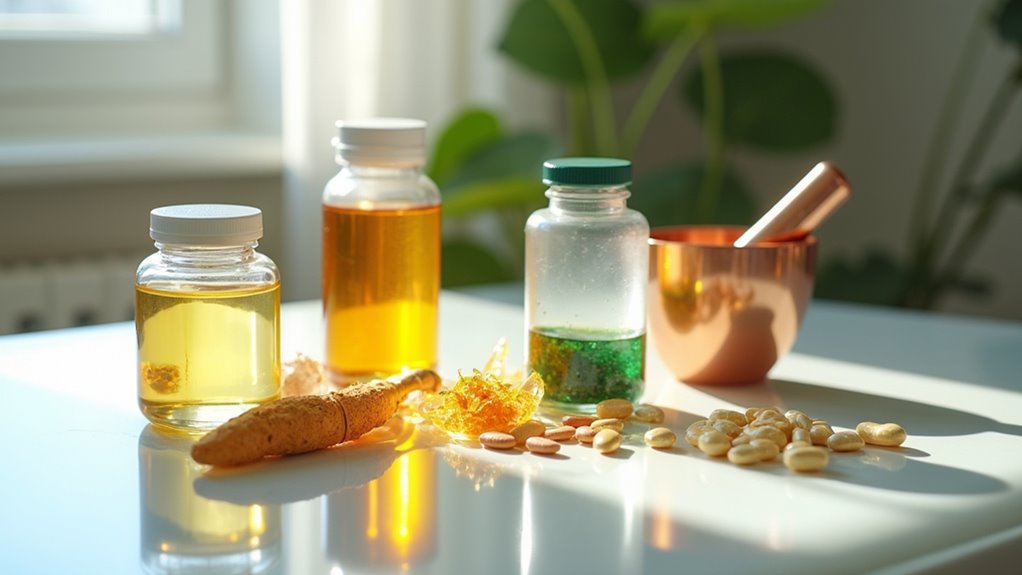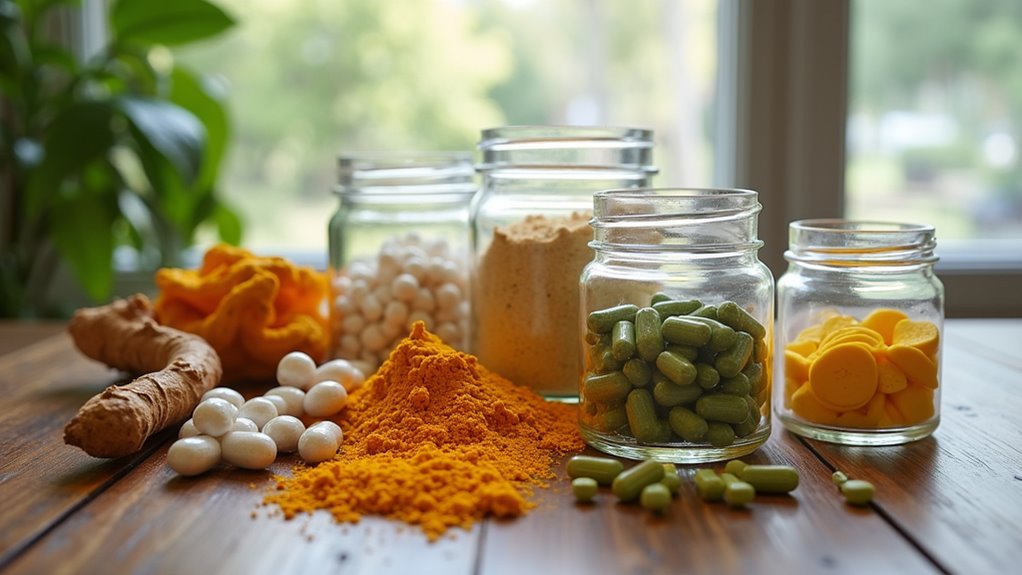Current research suggests you’ll find the strongest evidence for three key supplements in managing osteoarthritis: curcumin, glucosamine sulfate, and omega-3 fatty acids. Curcumin shows anti-inflammatory benefits comparable to ibuprofen, while glucosamine sulfate may help slow cartilage breakdown. You’ll need to consult your healthcare provider before starting any supplements, as effectiveness varies among individuals and interactions can occur. Understanding the complete evidence behind these and other joint supplements will help inform your treatment decisions.
Understanding Key Supplements for Joint Support

Several key supplements have emerged as potential therapeutic options for managing osteoarthritis symptoms and supporting joint health. Research indicates that glucosamine sulfate, particularly when combined with chondroitin, may offer modest improvements in joint function and pain relief. You’ll find that curcumin, derived from turmeric, demonstrates promising anti-inflammatory properties comparable to ibuprofen for knee osteoarthritis management.
While scientists continue studying the role of vitamin D in joint health, maintaining adequate levels appears essential, especially since deficiency can exacerbate rheumatoid arthritis symptoms. In addition, green tea’s EGCG antioxidant shows potential for protecting cartilage, though more human trials are needed to confirm its effectiveness. When considering supplements, it’s important to recognize that while evidence supports some benefits, results can vary considerably among individuals.
Most Researched Natural Options for OA Management

Research has consistently identified several natural supplements as leading candidates for osteoarthritis management, with clinical evidence supporting their effectiveness.
When you’re considering supplements for treating osteoarthritis, curcumin stands out for its anti-inflammatory properties, showing comparable results to ibuprofen in reducing joint pain. While glucosamine and chondroitin supplements have demonstrated modest benefits in slowing cartilage breakdown, S-adenosyl-L-methionine (SAM-e) has proven comparably effective as NSAIDs without their typical side effects. Though omega-3 fatty acids show stronger results for rheumatoid arthritis, they’re still beneficial for overall joint health. If you’re vitamin D deficient, supplementation may help manage your osteoarthritis symptoms by supporting bone health. You’ll find the strongest scientific backing for curcumin and SAM-e, while other supplements offer varying degrees of effectiveness.
Safety and Interactions of Joint Health Supplements

While natural supplements can offer relief for osteoarthritis symptoms, they come with critical safety considerations and potential drug interactions you’ll need to discuss with your healthcare provider.
Popular supplements might help with joint discomfort, but they’re generally safe only when taken as directed. Fish oil, glucosamine, and curcumin can interact with blood thinners and affect blood sugar levels in people with heart disease or diabetes. You might experience possible side effects like digestive issues or allergic reactions. Since the FDA doesn’t regulate these products, quality varies considerably between brands.
Talk to your doctor before starting any supplement regimen, especially if you’re taking prescription medications. More research is needed on long-term safety, but you can minimize risks by choosing reputable manufacturers and avoiding high doses of fat-soluble vitamins, which can accumulate to toxic levels.
Evidence-Based Benefits and Limitations
Scientific evidence on joint health supplements presents a complex picture of benefits and limitations. Research shows that popular supplements like glucosamine and chondroitin offer modest improvements for some osteoarthritis patients, while others experience no significant benefits. You’ll find stronger evidence supporting curcumin’s effectiveness, as it’s shown to match ibuprofen in reducing arthritis pain through its anti-inflammatory properties.
While vitamin D deficiency can worsen joint health and arthritis symptoms, maintaining adequate levels through supplementation may help. Green tea’s EGCG compound shows promise in laboratory studies, but we need more human research to confirm its benefits. The current evidence doesn’t support healthcare providers routinely recommending supplements for osteoarthritis treatment, as research results remain mixed and inconclusive for most joint health supplements.
Making Informed Decisions About Supplement Use
Before starting any supplement regimen for osteoarthritis, you’ll need to make thoughtful, evidence-based decisions about their use. While supplements may seem like a promising solution for joint pain, their effectiveness varies considerably, and they can interact with blood pressure medications or affect other health conditions.
Always consult healthcare providers before starting supplements, as their effectiveness varies and they may interact with existing medications.
- Your doctor needs to evaluate your specific knee pain, health history, and current medications to determine if supplements are safe for your situation, especially if you have rheumatoid arthritis alongside osteoarthritis.
- Many people don’t realize that supplements aren’t strictly regulated like prescription drugs, so you’ll need to research brands carefully and choose high-quality products.
- The scientific evidence for most joint supplements remains limited, so maintain realistic expectations about their potential benefits in managing your osteoarthritis symptoms.
Frequently Asked Questions
What Is the Most Effective Supplement for Osteoarthritis?
Research shows that a combination of glucosamine and chondroitin sulfate is most effective for osteoarthritis, particularly when paired with other evidence-backed supplements like turmeric curcumin and omega-3 fatty acids. You’ll get the best results by taking these alongside collagen peptides and hyaluronic acid. While boswellia serrata, MSM, and ginger root extract show promise, they’re most beneficial as complementary supplements rather than standalone treatments for joint health.
Do Supplements Really Work for Osteoarthritis?
The evidence on supplement efficacy data for osteoarthritis is mixed. While some natural anti-inflammatory supplements show promise, there’s no guarantee they’ll work for your joint health. Research suggests certain supplements may offer modest osteoarthritis pain relief and symptom management, but you’ll need to weigh supplement safety concerns carefully. Long-term supplement usage requires careful consideration, and you should always discuss osteoarthritis treatment options with your healthcare provider before starting any cartilage repair supplements.
Is There a Joint Supplement That Actually Works?
While you’ll find many joint health optimization products on the market, there’s no “magic bullet” supplement that’s definitively proven to work. Research shows modest benefits from some nutritional supplements for osteoarthritis, like glucosamine and chondroitin, but results vary. Natural anti-inflammatory supplements like curcumin and collagen-based joint support formulas may offer limited relief. Your best approach is combining doctor-recommended supplements with a holistic joint wellness strategy including exercise and proper nutrition.
What Is the Wonder Drug for Osteoarthritis?
There isn’t a single “wonder drug” for osteoarthritis. You’ll need an extensive approach combining multiple strategies for managing osteoarthritis symptoms. This includes prescription medications, natural remedies, topical treatments, and joint injections when appropriate. You can improve your condition through lifestyle adjustments like exercise, diet changes, and alternative therapies. Prevention of osteoarthritis progression often requires a personalized treatment plan that your healthcare provider can help develop.





